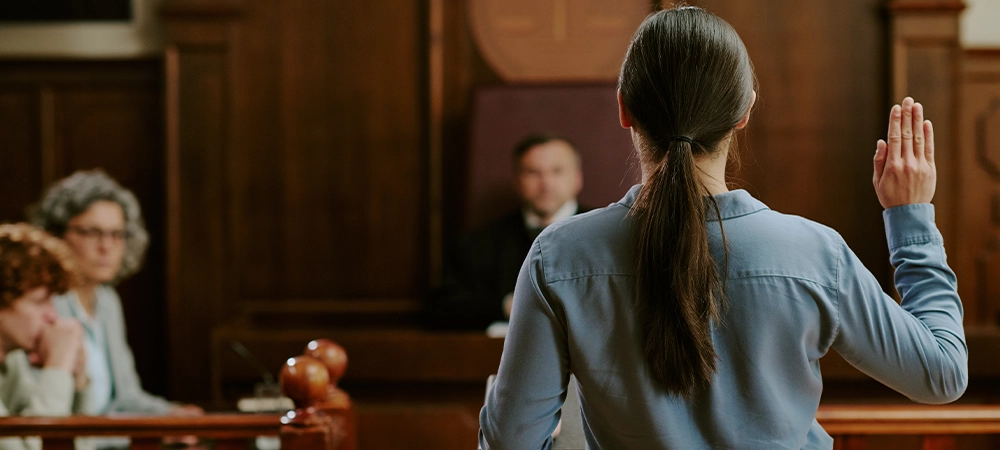Domestic assault cases are both sensitive and complex. They can have long-lasting consequences for everyone involved and rely heavily on solid evidence. If you’re involved in a domestic assault case, it can be important to know which types of evidence will be most critical to the case.
Knowing this can help to focus your mind and analyze what your next steps should be. Here, we’ll not only examine five key pieces of evidence in domestic assault cases but also how they can influence the outcome. Let’s get started.
Related Article: Top 5 Defences Against Domestic Assault Charges in Canada
1. Victim Testimony
The victim testimony is a huge aspect of domestic assault cases. This will be a firsthand account of the alleged assault. These types of assaults can often happen in private settings without witnesses, which can make this account the primary source of information.
The courts will also recognize that trauma can affect the memory of reporting the crime. Therefore, inconsistencies in statements won’t automatically undermine credibility. The context of the case has to be taken into account.
This will be a full and detailed account that includes what led up to the assault and any interactions following it. While this is often the cornerstone piece of evidence, the Crown still needs to prove the case beyond a reasonable doubt. This can be difficult to do with witness testimony alone.
Related Article: https://www.agpllp.ca/best-practices-for-handling-domestic-assault-allegations/
2. Physical Evidence
There will often be physical evidence in domestic assault cases. This includes injuries, marks, or signs of a struggle. This evidence becomes even more powerful if it was documented by medical professionals.
Medical reports from hospitals or clinics will be seen as highly reliable forms of evidence. If the pictures were self-taken or are described after they’ve healed, this will be seen as less reliable. Even so, they can still be important.
The timing and detail of these photos can be crucial. Photographs taken immediately following the assault are more likely to reflect the injuries. If taken days after the event, it can open the opportunity to cast doubt on the case.
Physical evidence can extend beyond injuries. Broken doors, furniture, or personal items can all point to a severe altercation. If physical interaction or the location of the crime is disputed, forensic evidence such as DNA or fingerprints can be used.
Related Article: How to get domestic assault charges dropped in Ontario
3. Witness Testimony
These types of assault are often done behind closed doors, but witness testimony can extend beyond a first-hand account of the incident. Others can give insight into the behaviour of individuals and the nature of the relationship.
For example, a witness could testify about the abuse they previously received from the accused. Alternatively, they may have witnessed previous threatening or abusive behaviour. This can all help to build the case for the prosecution as it establishes patterns of behaviour.
There can also be expert witnesses who can give their qualified opinion on a subject. An example here could be a doctor explaining how a specific bruise could have been formed. Other expert witnesses can cast light on psychological issues.
Of course, if there is a first-hand witness account, this can be extremely damming. The reliability of this witness can depend on a few factors, such as how clearly they saw the incident and the personal relationship they have with either party.
Related Article: https://www.agpllp.ca/your-rights-when-accused-of-domestic-assault/

4. Digital Evidence
For a long time now, electronic communications have played a huge role in court cases. This can include any messages, emails, social media posts, and phone calls. If it exists in the digital space, it can be used as evidence.
This can provide evidence of threats, harassment, and context. For example, if a series of threatening messages were sent prior to an assault, it showcases intent. As with much of this evidence, it isn’t a sure sign of guilt in itself, but it can help to build a bigger picture.
Digital evidence from after the assault can also be important, as it may be claimed that the accused intimidated or manipulated the victim. Digital forensic experts can be brought in if there is any doubt about the source or timing of this digital information.
5. Police Reports and Official Documentation
Finally, police reports of the incident will also be used. The court will want to know when the assault was reported, the victim’s initial statement, and if any visible injuries were recorded. Added to this, any general observations of the scene will be noted.
Other documentation will also be included, such as restraining orders, emergency room reports, or prior police reports. These can help to establish a history of behaviour. Any information the police have can be added as evidence.
Related Article: What Happens When You Press Charges for Domestic Abuse in Canada?

Frequently Asked Questions
Can the Crown prosecute a domestic assault with no physical evidence or third-party witnesses?
Yes. In Canada, corroboration isn’t legally required. A case can proceed—and even result in a conviction—on the complainant’s testimony alone if the judge finds it credible and reliable beyond a reasonable doubt. That said, any supporting evidence (photos, medical notes, 911 recordings, texts) often becomes pivotal to credibility assessments.
What happens if the complainant wants to “drop the charges” or later recants?
Only the Crown Attorney decides whether charges continue or are withdrawn. A complainant’s change of heart doesn’t automatically end a case; prosecutors will weigh all evidence and public-interest factors. Recantations are scrutinized, and courts may consider earlier statements, 911 calls, or digital records. Accused persons must not contact the complainant about the case—breaching no-contact terms is a separate criminal offence.
Are secret recordings, texts, or DMs admissible in domestic assault cases?
Often, yes, if they’re lawfully obtained and can be authenticated. Canada generally allows one-party consent audio recordings (you may record a conversation you are part of). Screenshots alone may be challenged; preserving originals, exports, and device backups strengthens authenticity. Do not hack accounts, guess passwords, or violate court orders to obtain material—illegal collection can spark new charges and jeopardize admissibility. Get legal advice before sharing recordings with police.
How long after an incident can charges be laid?
Domestic assault (usually Criminal Code s. 266) is a hybrid offence. If prosecuted summarily, there’s typically a 12-month limitation from the date of the alleged offence. If the Crown elects indictable, there’s no limitation period. Practically, police may lay charges whenever they have reasonable grounds—sometimes well after the incident—so timely legal advice is important.
- How should I preserve evidence—without breaking the law or hurting my case?
- Seek medical care promptly and ask for photographs/notes to be charted.
- Save everything: texts, call logs, voicemails, emails, social posts; back up devices; avoid editing/altering files.
- Document a timeline while events are fresh.
- Photograph injuries and the scene (include date/time if possible), then store originals securely.
- Respect orders/conditions: never contact the other party to “get statements” or retrieve evidence if a no-contact or release term exists—have your lawyer handle it.
Destroying or tampering with evidence can be a criminal offence and may harm credibility.
Final Thoughts
Domestic assault cases are complex, and evidence can sometimes be weak. If you’ve been accused of domestic assault, this is why it can be vital to speak with an experienced criminal lawyer as soon as possible.
Each case has its limitations, and a lawyer will quickly create a robust strategy to fight the case. If you need legal help, contact AGP LLP. We will be happy to take your call and offer a free consultation to see how we can help.





